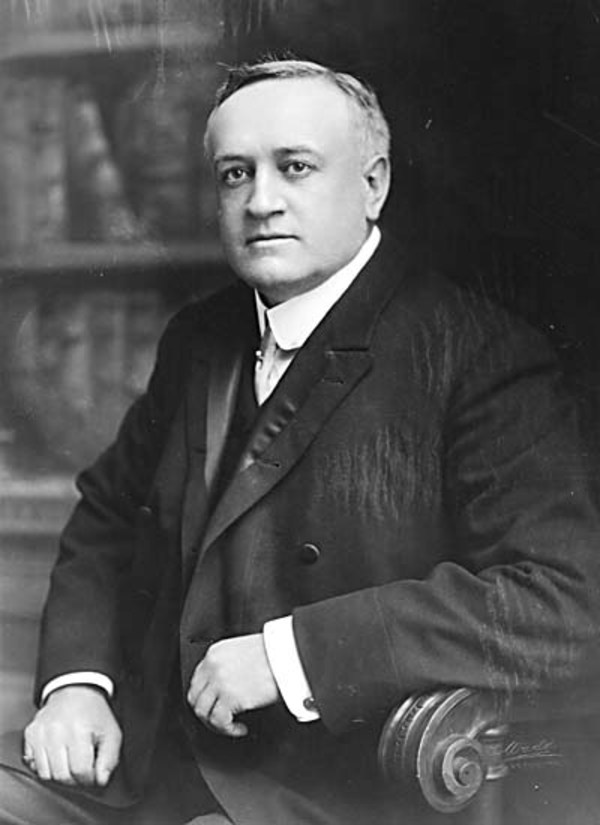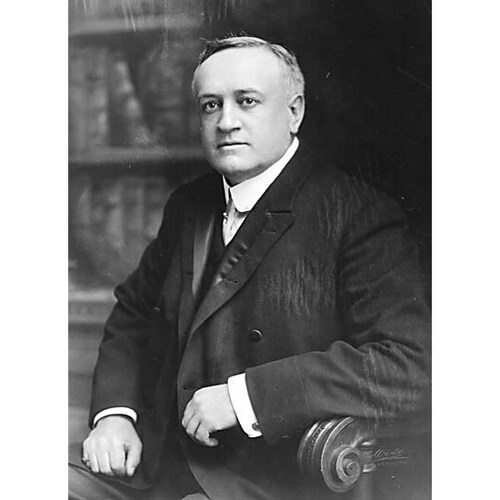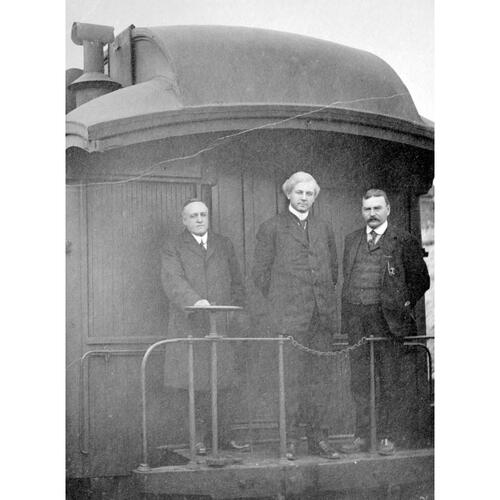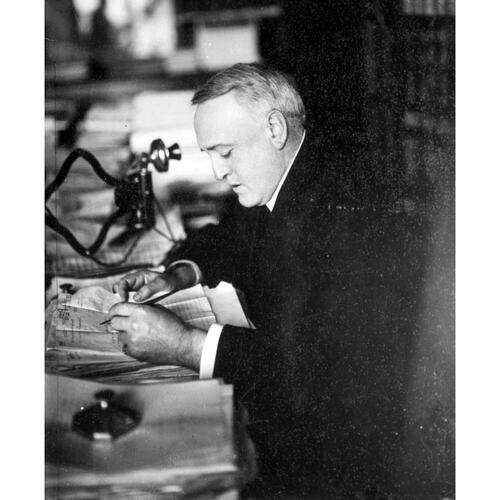
Source: Courtesy of Wikimedia Commons
BOWSER, WILLIAM JOHN, lawyer and politician; b. 3 Dec. 1867 in Kingston (Rexton), N.B., son of William Bowser and Margaret Gordon; m. 9 Sept. 1896 Lorinda D. Doherty (d. 12 July 1928) in Kent County, N.B.; d. 25 Oct. 1933 in Vancouver.
The son of a merchant, William John Bowser received his early education in the public schools of his hometown. He then attended Mount Allison College in Sackville and Dalhousie law school in Halifax, where his classmate Richard McBride* undoubtedly boasted of his native British Columbia. Bowser obtained an llb in 1890 and was called to the bar of New Brunswick that year. After briefly practising in Kingston, he moved to Vancouver early in 1891 and set up, with H. A. Lavelle, the firm Bowser and Lavelle. During his career he would head various legal partnerships that had a special interest in criminal law and were considered some of the most important in the province. Robie Lewis Reid and David Stevenson Wallbridge would be associated with him for many years. Bowser joined the masonic order in 1895 and served as provincial grand master in 1904–5.
Bowser’s first forays into politics were failures. He alienated some Conservatives by running as an independent Conservative in Burrard in the federal election of 1896. Provincial elections were not yet fought along party lines: candidates aligned themselves with the government or the opposition. Bowser lost in Vancouver City as a supporter of Premier John Herbert Turner* in the provincial election two years later.
Despite these setbacks Bowser remained active and he became an important member of the Conservative Party Association. In 1903 the press described his back-room activities as the “Bowser machine.” A decade later a Toronto journalist would report that “just operating his [political] machine is said to be the one joy of his life.” Bowser welcomed the formation of a Conservative government in June 1903 under his former classmate McBride – the first administration in the province established along party lines – and he placed fourth among the 5 Conservatives who swept the multi-member constituency of Vancouver City in the October 1903 general election. Once in office he advocated so strongly for his constituency that opponents accused him of ensuring that Vancouver got everything at the expense of other parts of the province. In the contest of 2 Feb. 1907 he led the polls in the city. During the campaign he had toured the Kootenays with McBride and angered voters in Nelson, where a blizzard was raging, when he commented that roses were blooming on the coast. Nevertheless, the Daily Colonist proclaimed after the election that “while the Premier himself was the hero of the fight … Mr. Bowser acquitted himself nobly.” It had been a hard battle but Bowser had “tried to make it a clean one.” In subsequent campaigns, he often accompanied McBride on provincial tours.
Like most of his contemporaries, Bowser wanted a “white British Columbia.” He introduced a private-member’s bill, the British Columbia Immigration Act, 1907, designed to keep out Asians and the “ignorant hordes” of Europe by requiring them to be able to read and write in English or “any language of Europe” in order to enter the province. Lieutenant Governor James Dunsmuir* reserved what the press referred to as the “Bowser Bill” on the grounds that it encroached on federal jurisdiction. The opposition alleged that the poorly drafted document was “part of a political game” in which Bowser appeared to oppose the entry of unpopular immigrants but actually assisted “corporate friends” who wanted to import Japanese labourers.
Despite reports that he might form a Conservative splinter group and the fact that he fell asleep during a “disappointing” speech by McBride on the need to pressure the federal government for “better terms” [see McBride], Bowser was named attorney general on 24 July 1907. On 2 August he was also appointed commissioner of fisheries [see John Pease Babcock]. The position of attorney general almost inevitably involved controversy. One of his first difficulties was the regulation of alcohol. In a provincial plebiscite held on 25 Nov. 1909 a narrow majority favoured giving municipal governments the option to control alcohol sales within their jurisdictions. Some critics had identified the McBride–Bowser machine with the liquor interests, and Bowser had tried to use a technicality to avoid taking action. However, in 1910 he bent under public pressure and brought in legislation that he described as “the most potent measure for the elimination of drink evils possessed by any Canadian province.” It did not satisfy those who wanted complete Prohibition.
As attorney general Bowser was responsible for maintaining law and order. Friends suggested that he was effective in doing so but critics claimed that he went too far in crushing discontent. Certainly he alienated organized labour, for which he had little sympathy. In 1912 he boasted of having “completely smashed” the Industrial Workers of the World whose members went on strike against the Canadian Northern Pacific Railway, then under construction. About 100 men were jailed despite the fact that authorities had difficulty finding offences with which to charge them. As acting premier during McBride’s absence, Bowser dispatched a militia unit, the 72nd Regiment (Seaforth Highlanders of Canada), to keep the peace during the Vancouver Island coalminers’ strike of 1912–14 [see Joseph Mairs*]. His decision won him praise from the opponents of labour but strikers and their sympathizers immortalized his actions in a satirical song, “Bowser’s Seventy-Twa.”
In 1913, because of a “large influx” of people who were “in the habit of carrying offensive weapons and making improper use of them,” he introduced a bill that allowed for the deportation of foreigners who were found with such arms. Critics said that by giving police new powers of search, the legislation violated the spirit of British law. On another matter, after showing some leniency towards members of the Doukhobor sect known as the Sons of Freedom, who refused to register births, marriages, and deaths or to send their children to school, he introduced the Community Regulation Act in 1914. Since individuals put in jail were regarded as heroes within the sect, the act imposed fines on the entire community. Despite his threats Bowser did not enforce the law, possibly because the Doukhobor leader, Peter Vasil’evich Verigin*, was vested with the property of the entire group. In any case, his patience paid off: for several years the Sons of Freedom conformed to provincial requirements. To help society adjust to changes introduced by the developing automobile industry, Bowser brought in the Motor-traffic Regulation Act, 1911, that, according to contemporary historians Ethelbert Olaf Stuart Scholefield and Frederic William Howay, was “accepted on all sides with the greatest satisfaction.”
Bowser’s relationship with McBride seemed so close that opposition members claimed the premier was Bowser’s puppet; they referred to the McBride–Bowser government or Bowser–McBride government and suggested that Bowser was the brains behind the administration. Rumours circulated that Bowser wanted McBride to enter federal politics so that he could obtain the premiership. In 1910, however, the opposition press reported that the two men were in conflict. Bowser was unhappy about being replaced as acting finance minister, a position that he had assumed on 22 Oct. 1909, the day Robert Garnett Tatlow* resigned from the cabinet over McBride’s railway policy. Conservative denials of a rift are persuasive. McBride and Bowser continued to work together, pressing the province’s claims on the new federal Conservative government of Robert Laird Borden, elected on 21 Sept. 1911.
While he was attorney general Bowser continued to practise law, despite the obvious conflict of interest. Bowser, Reid and Wallbridge were solicitors for the Dominion Trust Company of Vancouver whose failure in 1914, following the collapse of the real-estate boom, wiped out the savings of numerous British Columbians. Many people believed that Bowser must have known of the firm’s problems and that the Trust Companies Act passed in 1914 had been designed to serve Dominion Trust. Bowser denied advance knowledge of the organization’s difficulties and noted that the minister of finance, Price Ellison, not he, was responsible for inspecting trust companies. Few were convinced.
As early as 1912 the British Columbian economy had shown signs of recession, and during the first months of 1915, as the situation worsened, it seemed likely that the financially straitened province would have to pay the interest it had guaranteed on various railway bonds and aid the Pacific Great Eastern Railway. McBride announced a provincial election, and then cancelled it because of a divided caucus. Rumours circulated that Bowser was forcing McBride out of office. McBride defended Bowser in public; in private their relationship was strained. Prime Minister Borden worried that their quarrel would “be disastrous” to the party. They eventually mended fences, but suspicions persisted that Bowser wanted to take over the premiership and, according to the Omineca Herald, “constitute himself a real old time monarch.”
An ailing McBride retired on 15 Dec. 1915. Although certain party members had “personal feeling against” Bowser, McBride believed that they could be brought into line and that Bowser could win “handsomely,” so he nominated the attorney general as his successor. Bowser took office that day and retained the post of attorney general. Thomas Taylor was named provincial secretary, William Roderick Ross was appointed minister of lands, Alfred Cornelius Flumerfelt took on finance and agriculture, Lorne Argyle Campbell became minister of mines, Charles Edward Tisdall headed public works and railways, and William Manson accepted the presidency of the council. Bowser outlined a policy of “courage with caution,” including the end of “generous appropriations” to railway companies, but he could not escape the poor economy or memories of the scandals surrounding some of McBride’s cabinet ministers [see Ellison]. Although the First World War, which had broken out in August 1914, was a major cause of economic difficulties, British Columbians also blamed the McBride–Bowser government for their troubles. Tisdall and Flumerfelt were defeated in the by-elections necessitated by their appointment to cabinet; in the legislature the strengthened opposition continually brought up past irregularities in government business, especially those relating to railways. The premier faced problems with vigour, despite illness that kept him from the legislature for almost two months. His government authorized plebiscites on women’s suffrage and Prohibition, extensively reformed the Workmen’s Compensation Act, encouraged shipbuilding, and made plans to help returning war veterans. But it could not compete with the Liberal revival or the legacy of McBride’s years in office. The provincial general election of 14 Sept. 1916 resulted in what the Canadian annual review called “perhaps … the most complete overthrow in political history.” Only Bowser, who was saved by the soldiers’ vote, and 8 other Conservatives were returned to an assembly of 47 members. The Liberals formed a government under Harlan Carey Brewster* on 23 November.
Bowser remained party leader and headed the opposition, but it was a troubled job, obliging him to defend the McBride–Bowser administration. He managed to increase the number of Conservative seats to 15 in the general election of 1920. He was such a loyal partisan that it was claimed “the Conservative party was his religion.” Yet party dissidents challenged his leadership at the 1922 convention, where he secured 52.5 per cent of the vote. Coalescing with farmers and reform-minded businessmen under the banner of the Provincial Party, the rebels were led by Alexander Duncan McRae* and Sir Charles Hibbert Tupper*. The party had revived scandals involving the mismanagement of Pacific Great Eastern and the railway’s past contributions to campaign funds that implicated both the Liberals and the Conservatives. With regard to the PGE, Bowser claimed that he was “fighting for the honor of the late Sir Richard McBride and myself.” In the provincial election of 1924, the Provincial Party’s slogan was “Put [Liberal Premier John] Oliver[*] out but don’t let Bowser in.” The electors complied. Although the Liberals were still able to govern, Oliver was defeated in his own constituency and Bowser placed 13th in the 6-member riding of Vancouver. He resigned as Conservative leader in August and the caucus chose Robert Henry Pooley to succeed him.
When the Conservatives finally held a leadership convention in 1926, Bowser was a candidate. The party organization supported him but the caucus did not. Realizing the friction around him, Bowser withdrew, explaining that his candidacy “would not be to the advantage of the Party.” He did not abandon his ambitions and retained friends among the Conservatives, although the newly elected leader, Simon Fraser Tolmie, thought that it would be “in the interests of the party if Mr. Bowser would stay out of politics for the present.” Two years later residents of Victoria, where Bowser lived in retirement, asked him to run, but he told the Vancouver Daily Province that he would neither seek a nomination nor participate in the campaign. He gave no reason; his refusal may have been related to his wife’s serious illness. She died that summer.
The Conservatives won the election of 1928. As the lacklustre Tolmie administration struggled with the Great Depression and continued internal dissent, some of its members believed that only Bowser could save the government in the next contest. Others described Bowser’s Vancouver supporters as “malcontents and groundlings whose ideals are limited to the ‘trough.’” Bowser secured nominations in both Vancouver Centre and Victoria City for the election of 1933 and ran under the label of Non Partisan Independent Group. Although he was unwell, he campaigned vigorously, calling for “sane government” and attracting good crowds. On 25 October he suffered a heart attack and died within a few hours. As one friend said, “He died fighting as he would have liked to go.” He was buried with full masonic honours from St Andrew’s-Wesley United Church in Vancouver. His estate, valued at $133,204 for succession duties, consisted largely of real estate and stocks, and was left mainly to his nieces, including Eunice Margaret Irving, his sister-in-law’s daughter, whom he and his wife treated as their own.
At Bowser’s death, one journalist recalled how “he ran the show and failed often to heed sound advice, no matter who or where it came from.” Because of his pugnacious character and short stature, he was aptly nicknamed Napoleon. Prime Minister Arthur Meighen* did not know him well but acutely observed that “he appears to have very considerable ability but a great many enemies.” An epitaph in the Vancouver Sun well summarized his political career as “always a stormy one for he had the gift of inspiring the most undying loyalty and the bitterest of opposition.”
There is little information available in William John Bowser’s personal papers at BCA (MS-0699) and the premiers’ records (GR-0441) consist mainly of routine correspondence. At LAC, the Arthur Meighen fonds (R14423-0-6), the R. B. Bennett fonds (R11336-0-7), and the Henry Herbert Stevens fonds (R4681-0-8) contain some correspondence with Bowser on government and party matters and a few letters from other persons commenting on the premier. Apart from sketches in biographical dictionaries such as Canadian men and women of the time (Morgan; 1912) and E. O. S. Scholefield and F. W. Howay, British Columbia from the earliest times to the present (4v., Vancouver, 1914), little has been published on him. The ma thesis of V. K. Dailyde, “The administration of W. J. Bowser, premier of British Columbia, 1915–1916” (Univ. of Victoria, 1976), provides the most comprehensive account of his term in office. A variety of newspapers, often partisan, have been the best source for information on Bowser’s public career. They include the British Columbian (New Westminster, B.C.), the Daily Colonist (Victoria), the Vancouver Daily Province, the Vancouver Daily Sun, and the Victoria Daily Times.
BCA, GR-2951, nos.1928-09-397753, 1933-09-482770. PANB, RS 141 B7, F 15579, no.1189. Omineca Herald (Hazelton, B.C.), 2 April 1915. R. A. Campbell, Demon rum or easy money: government control of liquor in British Columbia from Prohibition to privatization (Ottawa, 1991). Canadian annual rev., 1910–27. CPG, 1896–1924. R. A. J. McDonald, “Sir Charles Hibbert Tupper and the political culture of British Columbia, 1903–1924,” BC Studies (Vancouver), no.149 (spring 2006): 63–86. M. A. Ormsby, British Columbia: a history ([Toronto], 1958). P. E. Roy, Boundless optimism: Richard McBride’s British Columbia (Vancouver, 2012); A white man’s province: British Columbia politicians and Chinese and Japanese immigrants, 1858–1914 (Vancouver, 1989). R. R. Walker, Politicians of a pioneering province (Vancouver, [1969]). George Woodcock and Ivan Avakumovic, The Doukhobors (Toronto, 1968; repr. Ottawa, 1977).
Cite This Article
Patricia E. Roy, “BOWSER, WILLIAM JOHN,” in Dictionary of Canadian Biography, vol. 16, University of Toronto/Université Laval, 2003–, accessed December 30, 2025, https://www.biographi.ca/en/bio/bowser_william_john_16E.html.
The citation above shows the format for footnotes and endnotes according to the Chicago manual of style (16th edition). Information to be used in other citation formats:
| Permalink: | https://www.biographi.ca/en/bio/bowser_william_john_16E.html |
| Author of Article: | Patricia E. Roy |
| Title of Article: | BOWSER, WILLIAM JOHN |
| Publication Name: | Dictionary of Canadian Biography, vol. 16 |
| Publisher: | University of Toronto/Université Laval |
| Year of publication: | 2018 |
| Year of revision: | 2018 |
| Access Date: | December 30, 2025 |





